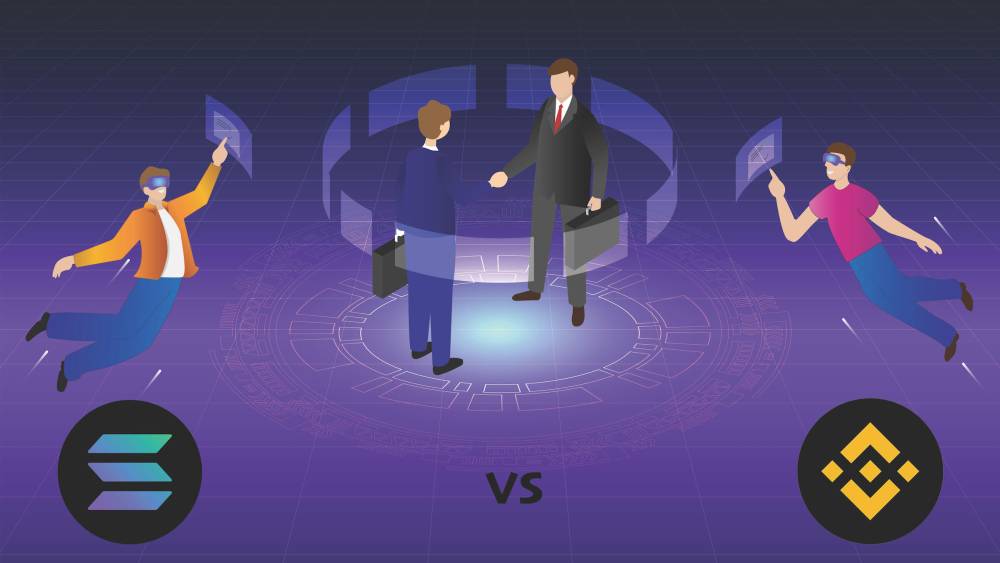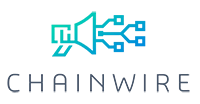The smart contract blockchain market has changed dramatically during the previous year.
While Ethereum remained the king in this field, its restricted scalability has caused gas fees to skyrocket, rendering DeFi and other dApps unviable for many (however, thanks to the current market downturn and network upgrade, Ethereum's average transaction costs have dropped dramatically).
As a result, competing platforms have grown in popularity in recent months as a means of challenging Ethereum's supremacy.
While Binance Smart Chain has swiftly established itself as a leader in this area, Solana is also a promising smart contract blockchain solution.
In this post, we'll compare Binance Smart Chain with Solana based on a variety of parameters.
What Is Binance Smart Chain?
Binance Smart Chain (BSC) is a highly scalable blockchain network that natively supports smart contracts, and it was launched as a project of crypto exchange Binance.
BSC has swiftly established itself as the leading Ethereum competitor in the crypto industry, thanks to its fully built infrastructure, cheap transaction fees, fast throughput, and short block times.
While their names are nearly identical, Binance Smart Chain and Binance Chain are 2 different blockchains. Here you can see how to purchase BNB without Binance.
The latter network, which was launched as the exchange's initial chain, has significant scalability but no native smart contract capability. As a result, it's largely used to run the Binance DEX as well as a few other apps.
BSC, on the other side, offers smart contracts while using the Proof-of-Staked-Authority (PoSA) consensus process and the high throughput of the Binance Chain to reach the same degree of scalability and speed (the two chains run in parallel with each other).
What Is Solana?
Solana, like BSC, is a highly scalable smart contract blockchain platform that has recently acquired a lot of attention.
However, because the network's members establish an agreement through a high number of validators, Solana achieves increased throughput and performance without compromising too much decentralization.
Solana was founded in 2017 during the ICO craze, and its mainnet has been in beta testing since March 2020.
The Proof-of-Stake (PoS) consensus technique is used by the blockchain network. The DLT solution augments PoS with Tower BFT, a proprietary version of Practical Byzantine Fault Tolerance (PBFT) that ensures network security and stability even when a large number of hostile nodes combine their voting strength to take control of the ecosystem.
Solana may achieve tremendous scalability while maintaining high security and decentralization as a result of all of these unique aspects, capabilities, and features.
However, while Solana has recently acquired a lot of interest, it is still behind Ethereum and a big rival like BSC in terms of acceptance.
Now that we've covered the basics of Binance Smart Chain and Solana, let's compare the two blockchains using a variety of parameters:
Scalability and Block Time
Because both projects use high-scalability blockchains, it's vital to compare their block time and throughput.
Binance Smart Chain has an average block time of roughly 3 seconds, according to BscScan.
BSC processed roughly 62.4 transactions per second (TPS) with a network utilization rate of 38.91 percent based on the numbert of daily transfers in the network. As a consequence, with full network usage, Binance Smart Chain can handle roughly 160 TPS.
Solana, on the other hand, had an average block time of 0.610 seconds in the preceding hour and processed roughly 700 TPS in the previous six hours, which is more than four times the capacity of BSC.
According to the project, Solana has a maximum TPS of 50,000 – which can be scaled up to 65,000.
Transaction Fees
In terms of transaction costs, both blockchains are rather affordable for consumers.
On Binance Smart Chain, a transaction costs roughly $0.24.
It's worth noting that this cost is based on the average of normal BNB transfers, BEP-20 token transfers, and smart contract transactions (e.g., for DeFi).
The charge for a transfer on Solana is $0.00025 when looking at several transactions (due to the platform's beta release, it lacks advanced network analytics and charts).
Usage and Activity
Now let's look at how users of both smart contract platforms use them and what they do with them.
According to the most recent data, BSC has 3.5 million transactions, whereas Solana has over 60 million.
Although Solana has completed more transactions than BSC, it should be emphasized that the Serum DEKS book of orders on the chain, which accumulates far more network resources than other blockchain systems, accounts for a substantial portion of these transfers.
Validators, Security, and Centralization
It's critical to examine the number of validators who participate in the rival blockchains' consensus process in order to acquire insight into the level of security and decentralization inside their networks.
As previously stated, the PoSA method is used by Binance Smart Chain, which requires just 21 validators (with the greatest voting power) to establish a consensus in order to validate transactions and add new blocks to the chain.
Solana, on the other hand, has no such restrictions, with over 1000 validators now on its network. As a consequence, it's reasonable to say that Solana has a higher decentralization degree than Binance Smart Chain.
However, others have speculated that the 15 validators with the most voting power, who control over 33% of the staked coins, might possibly suspend or censor Solana's network.
In terms of security, both blockchains use PoS consensus procedures, which require validators or their delegates to stake coins (to verify blocks).
Conclusion
Based on our analysis, both Binance Smart Chain and Solana have a strong chance of succeeding in the smart contract blockchain space.
While BSC has a larger usage rate and market valuation, as well as a thriving DeFi industry, its network makes some decentralization tradeoffs in order to attain greater scalability.
While Solana has a low adoption rate, the project can perform a large number of transactions per second while maintaining high levels of network security and decentralization.
The question now is whether one of these two blockchains can dethrone Ethereum as the leading smart contract platform in the future.
Bitcoin (BTC) $70,808.89 8.67%
{
Ethereum (ETH) $2,068.22 7.67%
Tether (USDT) $1.00 -0.01%
{
 Solana (SOL) 87.092176 6.82%
{
Solana (SOL) 87.092176 6.82%
{
Cardano (ADA) $0.28 9.72%
{
Chainlink (LINK) $8.85 7.54%
{
 Litecoin (LTC) $55.17 5.47%
{
Litecoin (LTC) $55.17 5.47%
{
Dash (DASH) $38.30 9.70%
{
 Polygon (MATIC) 0.25693 2.45%
{
Polygon (MATIC) 0.25693 2.45%
{
 Helium (HNT) 0.863633 13.11%
{
Helium (HNT) 0.863633 13.11%
{
 X-CASH (XCASH) 6.0E-6 3.77%
X-CASH (XCASH) 6.0E-6 3.77%Dogecoin (DOGE) $0.00 -5.77%







